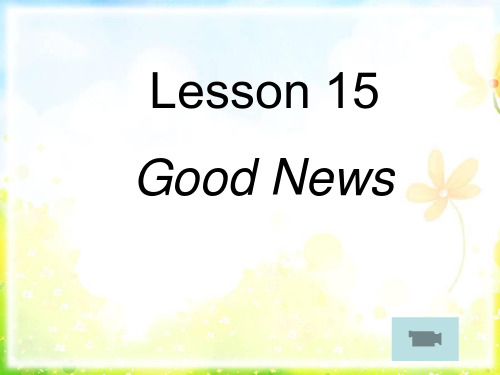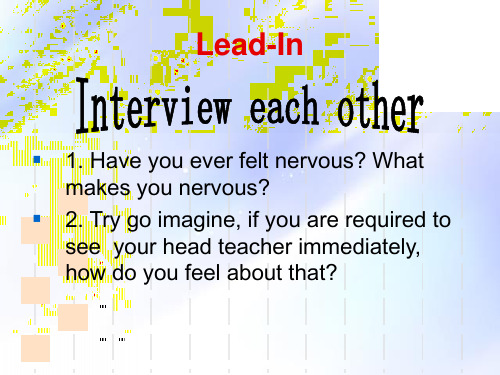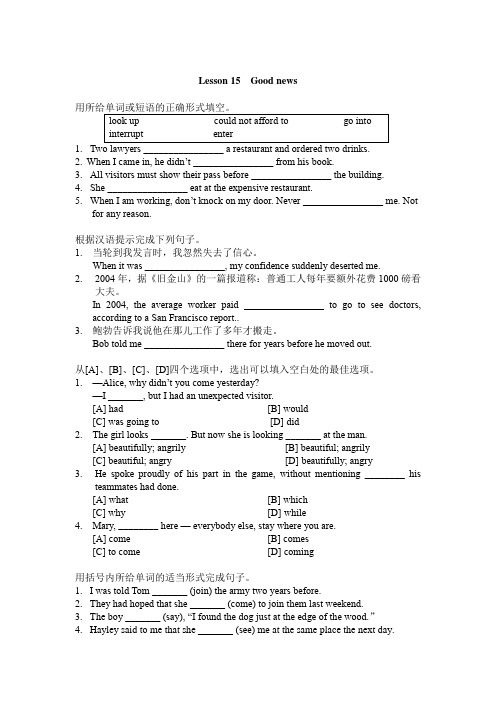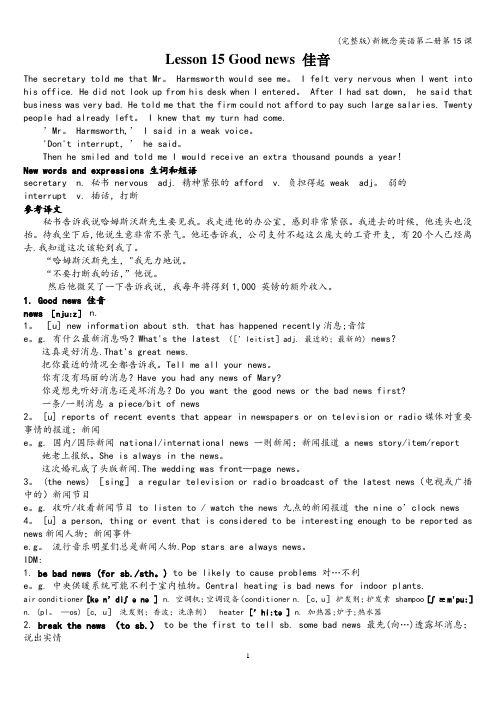新概念(二)语法练习 Lesson 15
新概念英语第二册 Lesson 15 Good news 佳音

新概念英语第二册Lesson 15 Good news 佳音重点句型补充例句1. When I was first learning to dance, I felt very nervous when taking group classes, mainly becauseI didn't want to look stupid or clumsy in front of others.2. I felt very nervous when I got up after my name was called. I heard my name called out. I got up, my legs unsteady and my whole body trembling like a leaf.3. Moreover, he did not look up from his desk the entire hour and a half that he wrote, stopping only when asked to go to lunch by the teacher.4. He told Susan that business was very bad and no new buildings were under contract.5. Since the Jamia could not afford to pay salaries regularly, it was decided that the lowest paid employee get salary on priority.6. People who could not afford to pay into the system would have their contribution paid for them by the state.Notes on the text 课文注释1 look up, 抬头看。
l新概念二Lesson15间接引语

被损坏
两者都不 答复某人
be damaged=be broken •neither reply to sb= answer sb
过去完成时的结构
had +v. 过分
★Words and expressions: ☆amusing adj.好笑的,有趣的 ☆experience n.经历,经验 ☆wave v.招手 ☆lift n.搭便车 ☆reply v.回答 ☆language n.语言 ☆journey n.旅行
• 今年夏天我无法度假因为时间不够。 I couldn't afford a holiday this summer because I don’t have any time. • 我们付不起这个价钱。 We can't afford to pay such a price.
☆weak
strong
Twenty people had already left. I knew that my turn had come.
worried:为以后的事情担心 upset:不安的,事情发生以后
☆nervous
☆afford
I have a lot of money, so I could afford an apartment. v. 买得起,经受得住,承担得起 afford sth: e.g. I can afford the book. afford money/ time: e.g. I can afford five yuan. afford to do sth: e.g. I can afford to buy the book. (注意:一定要加情态动词can)
The secretary told me that Mr. Harmsworth would see me.║ I felt very nervous when I went into his office. ║He did not look up from his desk when I entered.║After I had sat down, he said that business was very bad.
新概念英语第二册Lesson15

secretary 秘书 nervous 紧张的 afford 负担得起 weak 弱的 interrupt 打断
Review the text
▪ The secretary told me that Mr. Harmsworth would see me. I felt very nervous when. I went into his office. He did not look up from his desk when I entered. After I had sat down, he said that business was very bad. He told me that the firm could not afford to pay such large salaries. Twenty people had already left. I knew that my turn had come. 'Mr. Harmsworth,' I said in a weak voice. 'Don't interrupt,' he said. Then he smiled and told me I would receive an extra thousand pounds a year!
▪ 10.Then he smiled and told me (that)I would receive an extra thousand pounds a year! 间接引语 然后他微笑了一下告诉我说,我每年将得
到1,000英镑的额外收入。
▪ =He said, ‘You will receive an extra thousand pounds a year.’ 直接引语
新概念英语第二册课后练习答案lesson15

新概念英语第二册课后习题答案详解Lesson 15练习答案Key to written exercises1.关键句型练习答案A 1a The secretary told me that Mr. Harmsworth would see me.b‘Mr. Harmsworth will see you. ’2 a Mr. Harmsworth said that business was very bad.b ‘Business is very bad.’3 a Mr. Harmsworth told me that the firm could not afford to pay such large salaries.b ‘The firm cannot afford to pay such large salaries. ’B 1 told… would come/would be coming2 said…(had) cut3 told… had never played4 did he say…had done/would do5 did he tell…(had) bought/would buy6 said…could not7 said…(had) worked8 told…wrote/writes/had never written9 did you say…were/had been10 said…would wait2.难点练习答案1 study2 office3 nervous4 afford5 irritable3.多项选择题答案1. d根据课文第5-7行I knew my turn had come…I said in a weak voice, 可以判断出d. Hethought he would lose his job最符合课文的原义,也符合这一句子的因果关系。
新概念英语第二册Lesson 15 Good news 同步练习(含答案)

Lesson 15 Good newslook up could not afford to go intointerrupt enter1.2.When I came in, he didn’t ________________ from his book.3.All visitors must show their pass before ________________ the building.4.She ________________ eat at the expensive restaurant.5.When I am working, don’t knock on my door. Never ________________ me. Notfor any reason.根据汉语提示完成下列句子。
1. 当轮到我发言时,我忽然失去了信心。
When it was ________________, my confidence suddenly deserted me.2. 2004年,据《旧金山》的一篇报道称:普通工人每年要额外花费1000磅看大夫。
In 2004, the average worker paid ________________ to go to see doctors, according to a San Francisco report..3. 鲍勃告诉我说他在那儿工作了多年才搬走。
Bob told me ________________ there for years before he moved out.从[A]、[B]、[C]、[D]四个选项中,选出可以填入空白处的最佳选项。
1. —Alice, why didn’t you come yesterday?—I _______, but I had an unexpected visitor.[A] had[B] would[C] was going to[D] did2. The girl looks _______. But now she is looking _______ at the man.[A] beautifully; angrily[B] beautiful; angrily[C] beautiful; angry[D] beautifully; angry3. He spoke proudly of his part in the game, without mentioning ________ histeammates had done.[A] what[B] which[C] why[D] while4. Mary, ________ here — everybody else, stay where you are.[A] come[B] comes[C] to come[D] coming用括号内所给单词的适当形式完成句子。
(完整版)新概念英语第二册第15课

Lesson 15 Good news 佳音The secretary told me that Mr。
Harmsworth would see me。
I felt very nervous when I went into his office. He did not look up from his desk when I entered。
After I had sat down, he said that business was very bad. He told me that the firm could not afford to pay such large salaries. Twenty people had already left。
I knew that my turn had come.’Mr。
Harmsworth,’ I said in a weak voice。
'Don't interrupt,’ he said。
Then he smiled and told me I would receive an extra thousand pounds a year!New words and expressions 生词和短语secretary n. 秘书 nervous adj. 精神紧张的 afford v. 负担得起 weak adj。
弱的interrupt v. 插话,打断参考译文秘书告诉我说哈姆斯沃斯先生要见我。
我走进他的办公室,感到非常紧张。
我进去的时候,他连头也没抬。
待我坐下后,他说生意非常不景气。
他还告诉我,公司支付不起这么庞大的工资开支,有20个人已经离去.我知道这次该轮到我了。
“哈姆斯沃斯先生,"我无力地说。
“不要打断我的话,”他说。
然后他微笑了一下告诉我说,我每年将得到1,000 英镑的额外收入。
1. Good news 佳音news [nju:z]n.1。
新概念英语第二册Lesson15 Good news.
Can we afford to go abroad ?
2. 抽得出(或匀得出)时间,花费得起(时间):
e.g: We can't afford the loss of a day.
我们浪费不起一天时间。
T: 我抽不出时间。
I can't afford the time.
playing basketball?”
playing basketball.
他问我:“你喜欢打篮球吗? 他问我,我是否喜欢打篮球。 ”
Grammer - 2 直接引语转换间接引语 -不同句式的转变规则
2.3 特殊疑问句
直接引语 (变化前)
间接引语(变化后)
特殊疑问句 wh-词引导的宾语从句
My sister asked me , My sister asked me what I
间接引语(变化后)
带 to 的不定式 He asked us to be seated.
他对我们说:“请坐。”他请我们坐下。
Grammer - 2 直接引语转换间接引语
2.5 转换中的要点1-人称的转换
• 1 直接引语中的第一人称,一般转换为第三人称,如: He said,“I am very sorry.” ——>He said that he was very sorry.
nervous
to be able to buy or pay faofrford
useless,not strong
weak
a person whose work is supporting manage
secretary
Fast Reading
4 minutes
新概念英语2 Lesson 15 Good news
2023/3/7
莘阳希望每一位学子学业进步,理想成真!
The past
2021年
2022 年
The present
The future
2023 年
不能支付,afford为“有能力做……”常与can,could连用
Twenty people had already left. I knew that my turn had come.
turn在这里是名词,意为“轮流”、“轮班”、“(依次轮流时各自的)一次机会”;轮到我。
‘Mr. Harmsworth,’ I said in a weak voice.
2023/3/7
重点语法
间接引语He said that… He told me…
在第1册的第99-102课和第133-136课,我们已经接触到了直接引语和间接引语。在把直接引语改为间接 引语时,除了用动词say以外,还可用动词tell,后面可跟人名或代词作间接宾语,然后是以that引导的引语作 直接宾语。
例
‘I am busy,’ he said.
He says that he is busy.
He said that he was buys.
He told me that he was busy.
‘I never work on Sundays,’ she said. She says that she never works on Sundays. She said that she never worked on Sundays. She told Mr. Harmsworth that she never worked on Sundays.
重点语法
新概念英语第二册第15课-Good news
新概念英语第二册第15课:Good newsLesson 15 Good news佳音First listen and then answer the question.听录音,然后回答以下问题。
What was the good news?The secretary told me that Mr Harmsworth would see me. I felt very nervous when I went into his office.秘书告诉我说哈姆斯沃斯先生要见我。
我走进他的办公室,感到非常紧张。
我进去的时候He did not look up from his desk when I entered. After I had sat down, he said that business was very bad.他连头也没抬。
待我坐下后,他说生意非常不景气He told me that the firm could not afford to pay such large salaries. Twenty people had already left.他还告诉我,公司支付不起这么庞大的工资开支,有20个人已经离去I knew that my turn had come.我知道这次该轮到我了'Mr Harmsworth' I said in a weak voice.“哈姆斯沃斯先生”我无力地说'Don't interrupt' he Said.“不要打断我的话”他说Then he smiled and told me I would receive an extra &1000 a year!然后他微笑了一下告诉我说,我每年将得到1,000 英镑的额外收入!New words and expressions 生词和短语secretaryn. 秘书nervousadj. 精神紧张的affordv. 负担得起weakadj. 弱的interruptv. 插话,打断Notes on the text课文注释1 look up,抬头看。
新概念英语第二册lesson15.Good news
Grammar Box 3
Who broke that plate? ---- Mary says John broke it. ---- But I think Mary broke it. paid the bill washed the car burnt the shirt stained the carpet
Grammar Box 1
The doctor’s busy. ---- Why can’t you see the doctor now? ---- His secretary says he’s busy. The boss is at lunch. The manager’s on holiday. The headmaster’s ill. The dentist can’t see anyone.
extra
adj. 额外的 extra time 加时赛 extra work 额外工作 I think they didn’t want any extra help. 我想他们不需要额外帮助。 extra pay for extra work 额外工作的额外报酬
What was the good news? The writer would receive an extra thousand pounds a year.
interrupt
stop sb. speaking, break in/ cut in v. 中断,打岔,插嘴 别打断我。 Don’t interrupt me. Traffic in the city was interrupted by a snowstorm. 市内交通被暴风雪所阻断。 It is rude to interrupt. 打断别人的话是不礼貌的。
- 1、下载文档前请自行甄别文档内容的完整性,平台不提供额外的编辑、内容补充、找答案等附加服务。
- 2、"仅部分预览"的文档,不可在线预览部分如存在完整性等问题,可反馈申请退款(可完整预览的文档不适用该条件!)。
- 3、如文档侵犯您的权益,请联系客服反馈,我们会尽快为您处理(人工客服工作时间:9:00-18:30)。
Lesson 15 Good news
一、仿照例句用所给的动词将下列句子改写为间接引语。
(ask tell wish greet invite warn )
Example: He said, “ Good morning “
He wished me good morning.
1. “Come in and look around. “ said the shopkeeper.
2. He said “ Don’t walk on the ice, it isn’t safe. “
3. “Could you come to dinner tomorrow night?” he asked.
4. “Many happy returns on your birthday.” He said.
5. “You will never grow big and strong if you don’t eat properly,” the woman said to her little boy.
6. “You pressed the wrong button. Don’t do it again.” Said the mechanic.
7. “Do you think you will make a good husband?” the woman asked the her son.
8. “Will you expect your future wife to work?” the man asked his son.
9. “Will you be prepared to give up smoking?” the girl asked.
10. “What was the weather like during your holidays?” he asked.
二、用所给词的适当形式填空
Winter was coming. The night before Soapy (1)__________( put) three newspapers under his coat. But they (2)__________( fail) to keep out the cold as he (3)________(sleep) on the bench. He (4)__________(know) that the time (5)_________( come) to find a home for the winter. Three months of sure food and shelter and friends. Of the many ways of getting to prison, the best
(6)__________( be) to eat a big meal at some good restaurant. Then the waiter
(7)__________( hand) him over to the police if he (8)__________( tell) the waiter that he (9)_________(have) no money. The judge (10)__________(do) the rest. Leaving his bench, Soapy (11)_______(walk) out of the park. He (12)_______(know) he (13)_________(look) neat from the lowest button of his shirt up. He had shaved. His coat (14)__________(be) clean. If he (15)_________(can) just reach a table, success (16)_________(be) his. But as Soapy (17)__________(step) through the restaurant door, a waiter (18)__________(see) his worn trousers and
shoes. Strong hands (19)_____________(push) him back into the street.
三、完形填空
In the United States, the fall holiday season begins (1)_________Thanksgiving Day, the fourth Thursday (2)_______November. Originally a day of thanks (3)___________ good harvests, it is celebrated (4)________a big dinner. Christmas comes (5)______ December 25, about a month after Thanksgiving. (6)______ Christmas time, people give each other presents and send Christmas cards. Children especially look forward (7)______ this season. New Year’s Eve, December 31, comes a week (8)______ Christmas. (9)_______ New Year’s Eve, people have parties to celebrate the end (10)_________ the old year and the beginning of the new. This is the end of the holiday season.
( )1. A. at B. on C. of D. about
( )2. A. for B. at C. on D. in
( )3. A. for B. in C. with D. of
( )4. A. by B. with C. in D. after
( )5. A. at B in C. on D. of
( )6. A. On B. In C. At D. Of
( )7. A. to B. on C. at D. after
( )8. A. after B. at C. of D. on
( )9. A. In B. At C. On D. To
( )10. A. for B. of C. on D. in
答案:
一、1. The shopkeeper invited us to come / go in and look around.
2. He warned me not to walk on the ice as it wasn’t safe.
3. He invited me / us to dinner the following night.
4. He wished me many happy returns on my birthday.
5. The woman told her little boy that he would never grow big and strong if he didn’t eat properly.
6. The mechanic told me that I had pressed the wrong button and warned me not to do it again.
7. The woman asked her son if / whether he thought he would make a good husband.
8. The man asked his son if / whether he would expect his future wife to work.
9. The girl asked if / whether he would he prepared to give up smoking.
10. He asked what the weather had been like during my / our holidays.
二、1, had put 2, failed 3, had slept 4, knew 5, had come 6, was
7, would hand 8, told 9, had 10, would do 11, walked 12, knew
13, looked 14, was 15, could 16, would be/ was 17, was stepping
18, saw 19 pushed
三、1—5 BDABC 6—10 CAACB。
